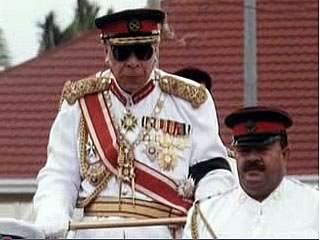Free for educational use
Questioning Tradition
Year of production - 1994
Duration - 4min 19sec
Tags - change and continuity, democracy, diversity, globalisation, monarchy, technological change, technology and society, Tonga, see all tags
On this Page

How to Download the Video Clip
To download a free copy of this Video Clip choose from the options below. These require the free Quicktime Player.
![]() Premium MP4 questioning_pr.mp4 (31.9MB).
Premium MP4 questioning_pr.mp4 (31.9MB).
![]() Broadband MP4 questioning_bb.mp4 (15.0MB), suitable for iPods and computer downloads.
Broadband MP4 questioning_bb.mp4 (15.0MB), suitable for iPods and computer downloads.
Questioning Tradition is an excerpt from the documentary Fit for a King, made in 1994.
Fit for a King
An intimate portrait of the King of Tonga, ruler of one of the smallest monarchies in the world. Filmed during the elaborate celebrations for his 75th birthday and the 25th anniversary of his reign, it shows King Taufu’ahau Tupou IV as a revered figure in Tongan society. The film also looks at the question of democratic reform as the country changes and modernises, and the people of Tonga speak about their future.
A Titus Films Production made with the participation of the Australian Film Finance Corporation Pty Limited.
Students explore principles, features and practices that characterise democracy in Australia, including the common good, separation of powers, government accountability and parliamentary elections.
Students evaluate the power, responsibilities and influence exercised by political leaders and elected representatives.
Students understand the role of political parties in Australian democracy.
Students understand how Australia’s system of government is similat to and different from other democracies.
As a constitutional monarchy, Tonga has enjoyed stability and relative prosperity for many decades with its citizens having high rates of adult literacy and longevity. King Taufa’ahau Tupou was much revered by his subjects and under his rule people enjoyed stability and prosperity. Despite his popularity, there was a questioning about the system of government during the latter part of his reign. In Tonga power and privilege are inherited. A pro-democracy movement argues that as Tonga modernises and changes, so too should the form of government include more participation in decision-making by all of its citizens.
Modernisation and change has included Tongans migrating in large numbers seeking work and better wages and increased engagement in the globalise economy. With this wider experience the social aspirations of many Tongans began to change.
The pro-democracy movement in Tonga has in recent years become strengthened. In 1998 the Tongan Human Rights and Democracy Movement (THRDM) was formed and called for democratic changes including the creation of an Upper House for nobles while making 21 seats in the Lower House directly elected by and open to commoners. No longer relegated to the margins of Tongan society, the THRDM’s influence is being felt at all levels of government, though reform has still been very gradual. In the 2005 elections, eight of the nine commoner seats in the Lower House were won by members of the new party.
This video clip comes from the documentary Fit for a King made during the lavish 75th birthday and 25th anniversary celebrations of the reign of King of Tonga, King Taufa’ahau Tupou IV in 1994. Celebrations were held throughout the kingdom and people paid their respects to the King.
King Taufa’ahau Tupou IV died on 10 September 2006. His 41-year reign made him one of the world’s longest-serving sovereigns. He was succeeded by his eldest son King George Tupou V.
- Students in groups are given a four column chart to assist them to clarify meanings of words raised in the video clip – Word, What I think it means, What the dictionary says, How it is used in the video – for the following words: monarchy, popular sovereignty, democracy, common good, government accountability parliamentary elections, representative government.
- Using data from the video clip and other sources, ask students to locate Tonga on a world map or in an atlas and desribe the system of government in Tonga. Using headings like elections, political parties, voting, government powers, role of leader, etc ask students to compare the system of rule in Tonga compared to that in Australia. How would they account for the differences?
- How would students describe the type of leadership that exists in their school? Who decides who will lead the school? Who makes the decisions? Can all members of the school community contribute to decison-making?
- Investigate what are the options for bringing about a change of government in a democractic system. Do all democracies allow for all the options? Why do students think there is a movement in Tonga for a change in the type of rule? What strategies are being used to bring about change? Will they succeed?
- Assess students’ understanding about the system of government in Australia. How is this different from that of Tonga? Why is it different? Is one a better system? Do governments have to be popular? Is it realistic that governments can represent all people all the time?
Go to Pacific Stories Learning for Interactive Compass Map with facts about the Pacific region.
For interview transcripts, books and references for this Digital Resource go to Pacific Stories, choose Fit for a King, select INDEX, and go to MORE INFORMATION.


